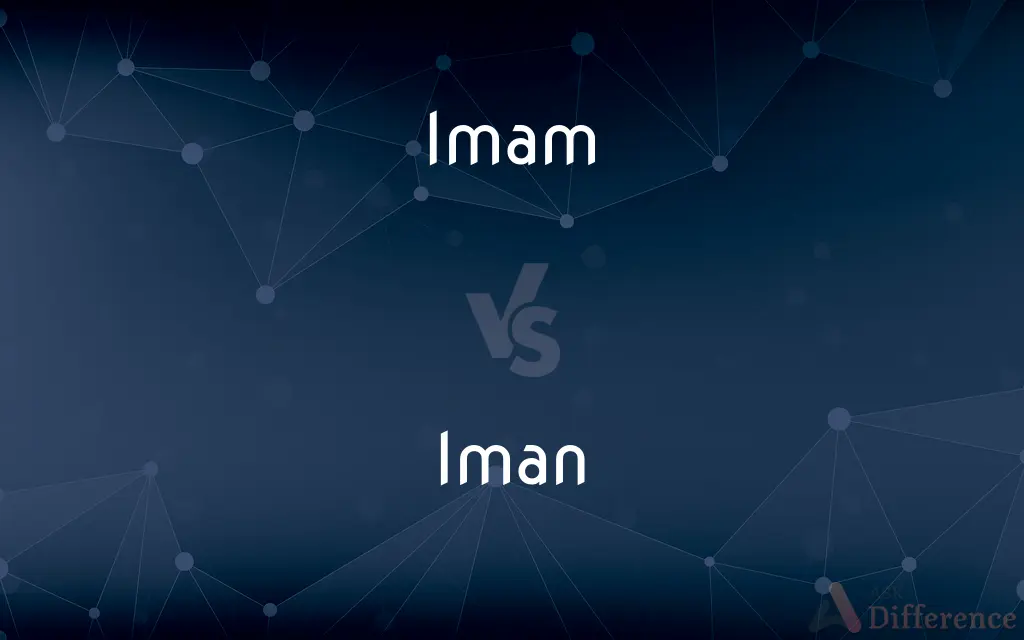Imam vs. Iman — What's the Difference?
By Urooj Arif & Maham Liaqat — Updated on March 5, 2024
Imam is a leader in Islamic prayer services, guiding Muslims in religious practices, while Iman refers to the faith and belief in the Islamic religion.

Difference Between Imam and Iman
Table of Contents
ADVERTISEMENT
Key Differences
An Imam is a title given to an Islamic leadership position, often used to designate a worship leader of a mosque and Muslim community. Imams lead prayers, offer guidance, and provide religious education. They play a crucial role in the spiritual and social aspects of Muslim life. Iman, on the other hand, is an Arabic term that translates to faith or belief, specifically faith in Allah, the prophets, and the teachings of Islam. It represents a fundamental aspect of a Muslim's religious life.
While the role of an Imam involves leading by example and offering guidance on Islamic laws and lifestyle, Iman is an individual's internal faith and conviction in the tenets of Islam. Iman is required of every Muslim, affecting their character, actions, and outlook on life, whereas the position of an Imam is a designated role that not all Muslims will assume.
Imams are responsible for leading the congregation in prayer, especially the five daily prayers, and delivering sermons. They are often seen as community leaders and are sometimes involved in resolving social and familial issues. In contrast, Iman is personal and intrinsic, influencing a believer's relationship with God, their prayers, charity, fasting, and pilgrimage. It is about the heart's commitment and understanding of Islamic principles.
An Imam's authority and responsibility are confined to the temporal world and the community's religious practices. Iman, however, transcends everyday actions, embodying the spiritual commitment and belief in the unseen, guiding a Muslim's purpose and actions in both the material and spiritual realms.
The distinction between Imam and Iman highlights the balance in Islam between community leadership and personal faith. While Imams serve as guides and leaders in the practice of Islam, Iman is the internal faith that motivates a Muslim's devotion to God and adherence to Islamic teachings.
ADVERTISEMENT
Comparison Chart
Definition
A leader of prayer in a mosque and community guide.
Faith and belief in the tenets of Islam.
Role
Leadership and guidance in religious practices.
Personal faith and conviction.
Importance
Essential for communal worship and guidance.
Fundamental to a Muslim's identity and actions.
Scope
Public and communal activities.
Personal and internal belief.
Impact
Influences social and communal aspects of Muslim life.
Shapes individual morals, ethics, and spirituality.
Compare with Definitions
Imam
A title for certain Muslim leaders.
Imam Ali is revered in Shiite Islam.
Iman
Belief in the six articles of faith in Islam.
His strong Iman was evident in his daily life.
Imam
A Muslim leader of prayers.
The Imam led the congregation in the afternoon prayers.
Iman
Faith in Allah and His Prophet.
Her Iman in Allah guided her through tough times.
Imam
Someone who guides in religious matters.
As an Imam, he provided insights into Islamic jurisprudence.
Iman
Inner faith that influences actions.
Their Iman inspires them to give generously to charity.
Imam
The leader in a mosque.
The local mosque’s Imam is respected for his knowledge.
Iman
Spiritual conviction in Islam.
Through learning, her Iman deepened.
Imam
A community leader in Islam.
The Imam also served as a counselor to his community members.
Iman
A key element of a Muslim's spiritual life.
Iman is central to being a Muslim.
Imam
Imam (; Arabic: إمام imām; plural: أئمة aʼimmah) is an Islamic leadership position. It is most commonly used as the title of a worship leader of a mosque and Muslim community among Sunni Muslims.
Iman
Pious adherence to the Islamic faith.
Imam
In law and theology, the caliph who is successor to Muhammad as the lawful temporal leader of the Islamic community.
Iman
A believer in the Islamic faith.
Imam
The male prayer leader in a mosque.
Imam
The Muslim worshiper who leads the recitation of prayer when two or more worshipers are present.
Imam
A ruler claiming descent from Muhammad and exercising authority in an Islamic state.
Imam
(Islam) the man who leads prayers in a mosque; for Shiites an imam is a recognized authority on Islamic theology and law and a spiritual guide
Common Curiosities
Do all mosques have an Imam?
Most mosques have an Imam to lead prayers and offer guidance, but in smaller communities, a knowledgeable community member may serve temporarily.
Is Iman static or can it change?
Iman can fluctuate, increasing with good deeds and worship, and decreasing with sin or neglect of religious obligations.
How is Iman measured?
Iman is internal and varies among individuals; it's not quantitatively measured but reflected in one’s actions, sincerity, and commitment to Islamic principles.
Are there different levels of Iman?
Yes, Iman has levels, from basic belief to higher levels of spirituality and conviction, influenced by knowledge, worship, and actions.
Can a woman be an Imam?
In most Islamic traditions, women can lead prayers for other women but not for mixed-gender congregations. Practices vary by community and interpretation.
Is belief in angels part of Iman?
Yes, belief in angels is one of the six pillars of Iman in Islam.
What's the difference between faith (Iman) and practice (Islam)?
Iman refers to the belief in Islamic tenets, while Islam encompasses the practical aspects of this faith, including rituals and observances.
What happens if a community does not have an Imam?
Communities without an Imam may select a knowledgeable and respected member to lead prayers and provide guidance temporarily.
How do Imams get their position?
Imams are usually appointed based on their knowledge, piety, and ability to lead, often by the mosque's administration or community consensus.
Can someone lose their Iman?
Iman can weaken or be lost through actions that go against Islamic teachings, but it can be regained through repentance and good deeds.
Does Iman play a role in Islamic jurisprudence?
While Iman influences a Muslim's understanding and application of Islamic law, jurisprudence (fiqh) primarily deals with the interpretation of religious texts.
Can anyone become an Imam?
Typically, an Imam is someone with thorough knowledge of Islam and the Qur'an, respected within their community, and capable of leading prayers.
Can Iman affect mental health?
Strong Iman can provide comfort, resilience, and a positive outlook, impacting one's mental and emotional well-being positively.
Is there a hierarchy of Imams in Islam?
The concept of a hierarchy can vary; in Sunni Islam, there's less formal hierarchy, while in Shia Islam, Imams have a more defined spiritual and lineage-based status.
Can non-Muslims understand Iman?
Non-Muslims can understand the concept of Iman intellectually, but its deeper spiritual significance may be fully appreciated through the lens of Islamic faith and practice.
Share Your Discovery

Previous Comparison
Shine vs. Dazzle
Next Comparison
Maize vs. MilletAuthor Spotlight
Written by
Urooj ArifUrooj is a skilled content writer at Ask Difference, known for her exceptional ability to simplify complex topics into engaging and informative content. With a passion for research and a flair for clear, concise writing, she consistently delivers articles that resonate with our diverse audience.
Co-written by
Maham Liaqat















































